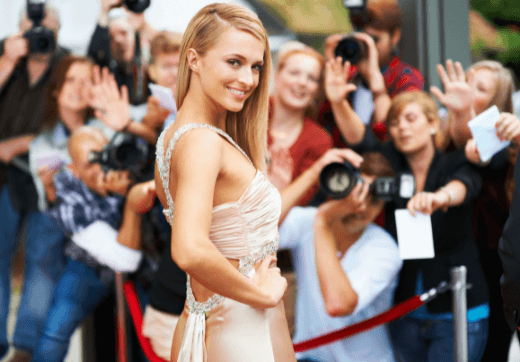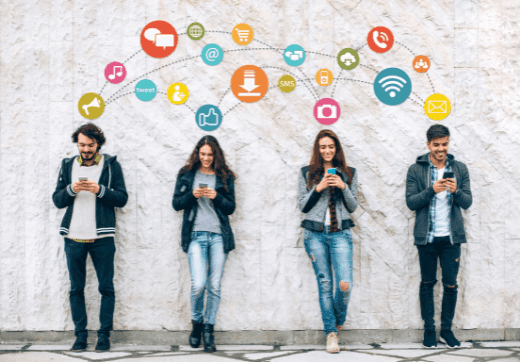If you have ever felt close to a celebrity and you swear you two know each other. You are not the only one. As we sit more than ever in front of screens, especially during Covid 19, these connections known as parasocial relationships have thrived.
No matter what form it takes from a crush on someone who doesn’t know you or a profound friendship with a celebrity parasocial relationships are normal. But sometimes unhealthy.
A parasocial relationship is a one-sided imaginary relationship that an individual forms with a public figure who they don’t know personally. They often resemble familiar bonds or friendships.
Parasocial relationships can basically happen with anyone, but they are especially common with public figures like celebrities, musicians, influences, athletes, writers, hosts, and directors. They also don’t have to be real characters from TV shows, movies, and books that can take up the same mental space.
Most of these relationships come from when someone is admired at a distance. Most occur through social media and in other settings like with a professor, pastor, or someone you see around the campus.
Movies and Radio can give the illusion of a face-to-face relationship with a performer.
Parasocial interaction is a term created by the research of Donald Horton and R. Richard Wohl in 1956. It involves a conversational give and take between a person and a public figure.
These kinds of connections can be quite healthy because such parasocial relationships usually don’t replace other relationships. Most people do this.
They might serve a purpose that other relationships don’t. You don’t need to worry that the person you have a parasocial relationship with will be mean or unkind or reject you.
It is a way for teenagers to connect to someone in a risk-free way and experiment with their identity.
While there are some stories of parasocial relationships turning dangerous, the vast majority will never reach that point. These are rare incidents where someone loses touch and creates an obsessive, unhealthy connection. This is more the exception than the rule.
Having a parasocial relationship with a fictional character in a tv show makes it pretty clear that it is a one-sided fantasy. But when the parasocial aspect appears between real people, it can become a bit tricky. We are bombarded with endless famous personalities, and we can enjoy the content of our favorite influencers, but we can also interact with them through likes, subscriptions, and comments.
Regardless of how often we remind ourselves that social media isn’t our real life and that the highlight reels are just a show, we can’t keep ourselves away from creating a bond with these online personalities.
The more content they share, the more information we think we can get. Unless we know the person in real life or have verified information on what they are outside of their online persona, we cannot really see beyond what they decide to share with us.

In such an overwhelming atmosphere of social bonding, it is inevitable that someone may cross the line the are many cases where celebrities and influences were contacted, stalked, and even harassed by their fans. Once people see the public figures’ private life every day, in their living space, their backyard, or with friends and family forming a parasocial relationship becomes pretty easy.
Being so attracted to someone can also cause us a problem whenever we find out some information that contradicts everything we thought we knew. This can be past bad behaviors or some old photos showing them in an inappropriate situation. It can make us feel deceived and disappointed, which can lead to some other serious consequences like public voicing our disapproval and resentment about someone we never saw in real life.
Whenever someone perfectly crafted image falls apart, we need to remind ourselves that the public profile is only one part of that person that you be parasocial connected to is the same normal imperfect human being with their own problems like everyone else.
A parasocial relationship with a fictional character can be pleasant, reassuring, and motivating, even though we know the person isn’t real. However, we need to keep in mind real people are just as human as we are. No amount of our fantasy is gonna make them more than that.
We need to recognize the limits and dangers of romanticizing the people we see on screen and learn to accept them as just regular human beings as well as respect their right to privacy. It will allow us to focus more on our own lives to make the actual changes in the world around us and not just post comments online.
Parasocial bonds often help to fill gaps in real-world relationships because they are mostly risk-free to feel more connected to the world. They can also be developmental building blocks and, in our use, often take the form of crushes or admiring someone as a role model.
We are wired to be social creatures. When our brains are at rest, they imagine making connections. With the rise of new technology constantly shuffling personalities in our faces, it only makes sense that we connect with them as we relate to people in the real world.
The COVID-19 pandemic only includes our capacity for parasocial relationships. According to a May 2021 study, parasocial closeness increased when social distancing became the norm. Our favorite media figure became more meaningful throughout the pandemic. It may be that people are sometimes drawn toward people who they admire as a way to help loneliness.

Many public figures, especially influence, figured out how to encourage parasocial relationships in their online communication. It is why they will call themselves your best friend while looking directly into the camera and developing inside jokes. This makes you almost feel like they know who you are, blurring boundaries between social media and real life.
To an extent, celebrity culture is built almost entirely upon forming such connections with as many people as possible.
It is fascinating that social media gives people increased access to celebrities. People may have a stronger sense of connection to the person and feel like they know them even more because they can see the celebrity in their home. However, it is important to remember that any public figure is just projecting what they want their audience to see.
Social media has greatly increased the access fans have to celebrities. It creates a perceived closeness.
If they are a friend, but they have no idea who you are, it will satisfy the criteria of a parasocial relationship.
It can feel natural to consume everything your favorite celebrity or artist produces. But being a fan and having a parasocial attachment are two different things.
It is not the amount of time you spend thinking about the person that makes it a parasocial relationship. It is the way you are feeling.
The key difference between the two lies in the bond.
You can be a super fan of a celebrity and not have a parasocial relationship with them. If you admire someone, you would see a movie just because they were in it. You don’t feel like you are friends with that actress.
Many of our social interactions have changed during the pandemic, and people feel starved for such interaction.
Sometimes people form parasocial attachment because they aren’t getting those needs met in other ways. Parasocial aren’t as good as real relationships but better than no relationships.
It becomes dangerous when we start stalking and replacing such relationships with our own.
Ask yourself some questions What is this relationship doing for me? Why am I so obsessed with this celebrity? Am I diverting myself from my own issues?
The chance of rejection empowers individuals to mode and identify with choosing who naturally brings out a natural emphatic response.
Parasocial relationships remain one-sided. They transformed into a more interactive environment allowing individuals to communicate with their person and increasing the intimacy and strength of such a relationship.
They provide companionship and are influenced by social attraction. The viewer experience a connection with the media user and expresses feelings like gratitude, affection, longing, encouragement, and loyalty towards them.
A mutual connection is important in sustaining a relationship with real-life friends and familiarity. It also occurs in parasocial relationships by getting your favorite celebrities’ newest updates.

There is an increased sense of knowing the personas or the perception of parasocial interactions with high reward and low chance of rejection.
Some research found the stigma of such relationships lets participants believe they can broaden one’s social network rather than restrict it.
Parasocial relationships are important to viewers and also advantageous because of the support viewers gain from them.
The individuals of such bonds often express appreciation towards their favorite person for helping them get through tough times. Additionally, some people help it significantly shape their own identity.
The support a parasocial interaction provides is valuable to the viewer who engages in them. These relationships are a good way to expand an individual’s social network through social media.
Conclusion
Despite some negative aspects, parasocial relationships can, in many ways, be beneficial because of the potential support a viewer can get from them. Still, we must make sure that we don’t prioritize them over real relationships or turn them into dangerous behavior.
Living online can be fun, but nothing can replace the real world and the real people around us.